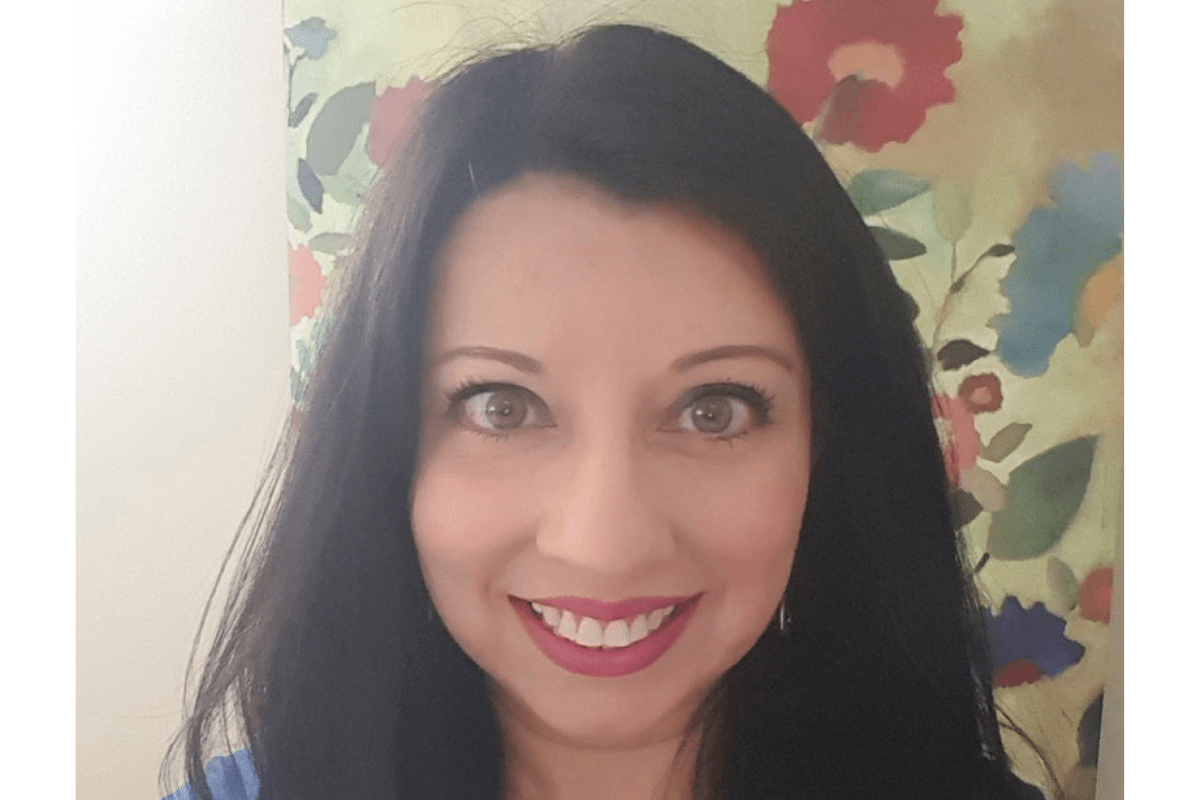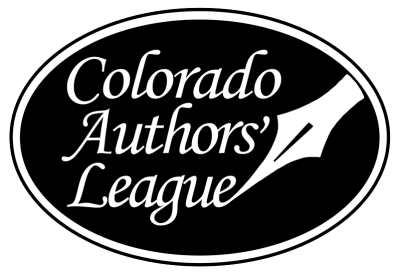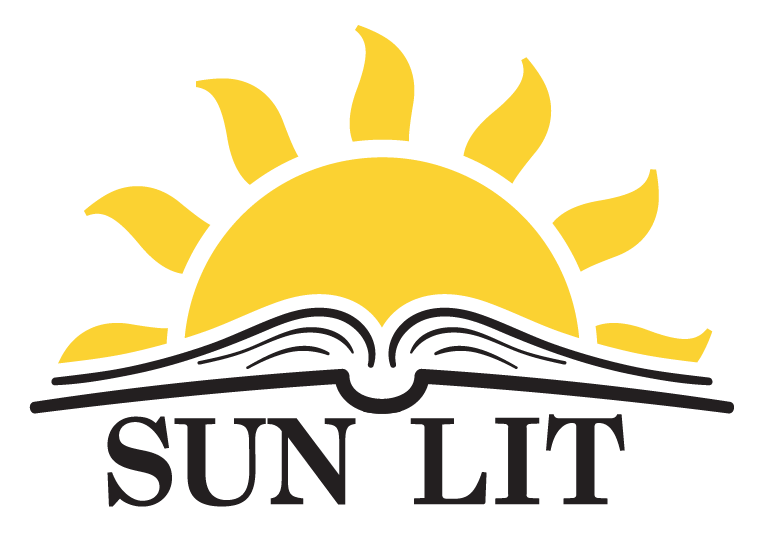
Ausma Zehanat Khan holds a Ph.D. in international human rights law with a specialization in military intervention and war crimes in the Balkans. She is also a contributor to the anthologies “Private Investigations,” “Sword Stone Table” and “The Perfect Crime,” and the former editor-in-chief of Muslim Girl magazine. A British-born Canadian and former adjunct law professor, Khan lived and worked in the Denver area before relocating to Washington, D.C. with her husband.
Her novel “Blood Betrayal” won the 2024 Colorado Book Award for Mystery.
SunLit: Tell us this book’s backstory. What inspired you to write it? Where did the story/theme originate?
Ausma Zehanat Khan: I’ve been wanting to write about the racial divide in this country for some time, and I’m deeply interested in the question of emotional and physical borders, and how the use of force is sanctioned to protect those borders. So my novel is premised on scenarios where people of color come up against the excessive use of force by police in their communities. Why does that happen and why do we, as citizens of the same nation, respond so differently to it, depending on the color of our skin, and the idea of our place in the world?
Writing a crime novel about the police killings of a young Black man and a young Latino, with three lead investigators who are women—a Muslim woman, a Latina, and a Black civil rights attorney—gave me the opportunity to explore these questions from very different perspectives. The story felt urgent and necessary to me.
SunLit: Place this excerpt in context. How does it fit into the book as a whole? Why did you select it?
Khan: I selected it for impact and because it encapsulates the novel’s central themes. A white police officer mistakenly shoots and kills a young Black man whom he assumes is a criminal. Scenarios like this have become routine in the United States in recent years. And it was important to me to reflect on that knowing that the state of Colorado ranks fifth in the nation in terms of officer-involved shootings.
UNDERWRITTEN BY

Each week, The Colorado Sun and Colorado Humanities & Center For The Book feature an excerpt from a Colorado book and an interview with the author. Explore the SunLit archives at coloradosun.com/sunlit.
Some people will read this chapter and believe that the shooting was justified. Others will read it and feel outrage. This excerpt is a good way to test our assumptions about the Other and our own deeply held convictions about race and society.
SunLit: Tell us about creating this book. What influences and/or experiences informed the project before you sat down to write? And once you did begin to write, did the work take you in any unexpected directions?
Khan: Before I became a full-time writer, I was an immigration and refugee lawyer, as well as a professor of international human rights law. So how we approach the question of borders, race, and belonging has always informed my work. And because one of the victims in my novel is Black, and the other is Latino, I read a great deal about the Black Lives Matter movement, and about the crisis at the southern border as a prelude to starting this book. As a Muslim woman, I was already well-informed about the Muslim ban, and these three issues became the focal point of the book.
I plot my novels thoroughly in advance, but I will say the excursion into two of my detectives’ family histories—excavating their roots in Afghanistan and Palestine—became more central to the novel than I had expected or originally planned for.
SunLit: Are there lessons you take away from each experience of writing a book? And if so, what did the process of writing this book add to your knowledge and understanding of your craft and/or the subject matter?
Khan: I always tell myself to get started on a book much sooner, so I’m not as pressured approaching deadline, but there’s something about that pressure that seems to unlock my creativity. Maybe it’s desperation.
But yes, I learn craft lessons from each book—such as how to keep my readers engaged, faster plotting and pacing, deeper character development, and so on. In terms of subject matter, I’m always astounded by how my assumptions about an issue are contradicted by my research.
For example, I had no idea how much profit is involved in militarizing the southern border as if our country is at war. I learned about an annual arms and munitions convention held in the U.S., where arms manufacturers and security technology developers vie for government contracts, and the best way to secure those contracts is to think of those trying to get across the border as a dangerous enemy army. After years of working with refugees, this casual militarization and dehumanization in the name of profit, shabbily disguised as patriotism, shocked me.
SunLit: What were the biggest challenges you faced in writing this book?
Khan: Corralling these massive social justice issues into a story about ordinary people who face desperate decisions. And taking myself and my politics out of the book to reflect a wide range of viewpoints so my readers can decide for themselves how to interpret the story.
SunLit: If you could pick just one thing – a theme, lesson, emotion or realization — that readers would take from this book, what would that be?
Khan: The Other is not the enemy. We have much more in common than we think, and if we knew the depths of not only the suffering but the humanity of others, we might attain a wiser and more peaceable understanding of our world.
SunLit: In a highly politicized atmosphere where books, and people’s access to them, has become increasingly contentious, what would you add to the conversation about books, libraries and generally the availability of literature in the public sphere?
Khan: I think that those who want to ban books are terrified at heart. They’re afraid of how literature can both enlighten and empower us, teaching us to build instead of to destroy, to love instead of hate. If you take away the weapon of demonization, what are you left with? The belief that we are one human family, worthy and valuable exactly as we are. The question we need to answer is why that is so frightening to some.
SunLit: Walk us through your writing process: Where and how do you write?
Khan: When I’m really ready to work on a book, I write at home in my office, surrounded by beautiful books, with the light coming in my open windows. I keep my phone and other distractions far away from me, and I usually write five hours a day, at the same time each day, five days a week. On the weekends, I edit what I’ve written, and take a break to clear my mind so I’m fresh for the following week. I write a very detailed outline of my novel before I begin, and I try to stick to that outline as closely as possible. But if I venture off course, I immediately adjust the outline, so things add up and make sense at the end.
SunLit: Why did you choose a Muslim woman as your lead detective? Does her name—Inaya Rahman—hold any significance for you?
Khan: I wanted to write a character close to my own roots—someone comfortable and familiar to me for several reasons. One, because the crime fiction I grew up on was notable for its absence of diversity or diverse perspectives. Two, there was so much else I had to research and learn for this series, that I needed a touchstone that made the process easier. Three, I also eventually wanted to write about my parents’ roots.
“Blood Betrayal”
Where to find it:

SunLit present new excerpts from some of the best Colorado authors that not only spin engaging narratives but also illuminate who we are as a community. Read more.
Having Inaya as my lead detective gave me all of those gifts, and her unique identity as a practicing Muslim also gave me an entry point into the polarizing discourse that dominates our politics. The name “Inaya” means “care” or “protection,” while the root word for “Rahman” means mercy. Given that most communities of color do not necessarily view police officers as serving and protecting them, I thought Inaya’s name made an interesting statement: She’s a woman of color in an impossible position, trying to do her best.
I also chose the name Inaya because I was inspired by the historical figure Noor Inayat Khan. During the second World War, she was a British wireless operator sent to France to aid the French resistance. She was eventually caught and executed at Dachau, and after her death, was awarded Britain’s highest civilian honor, the George Cross. These are the kinds of stories about Muslims that rarely make the headlines, another important reason to resurrect her through my lead detective.
SunLit: Tell us about your next project.
Khan: I’m currently working on the third novel in the Blackwater Falls crime series, the sequel to “Blood Betrayal.” The crime focuses on the murder of a young activist and its implications for Lieutenant Seif, Inaya’s boss, when he finds out that his brother is involved. It’s a deeply political novel that aims to do what I always hope to do—reconcile our differences and recognize our common humanity.
Just a few more quick questions
SunLit: Do you look forward to the actual work of writing or is it a chore that you dread but must do to achieve good things?
Khan: Sometimes I can’t wait to write, other times it’s definitely a chore driven by a deadline. It depends on what else is going on in my life at the time.
SunLit: What’s the first piece of writing – at any age – that you remember being proud of?
Khan: I won third place in a Royal Canadian Legion contest for an essay called “Why I Am Proud to Be a Canadian.” I was pretty excited about that when I was 10 years old.
SunLit: When you look back at your early professional writing, how do you feel about it? Impressed? Embarrassed? Satisfied? Wish you could have a do-over?
Khan: Looking back, I still feel deeply satisfied by my debut novel “The Unquiet Dead.” I spent a decade researching the Bosnian genocide and to be able to tell part of that story will always be the most significant thing I have ever done. However, speaking purely as a writer, there is an entire subplot I wish was a little more subtle.
SunLit: What three writers, from any era, can you imagine having over for a great discussion about literature and writing? And why?
Khan: The French-Lebanese writer Amin Maalouf because I’m a huge fan of his books and his immense knowledge of history. He’s my favorite writer and his books are deeply funny and enlightening, especially “Samarkand”, his masterpiece.
The great Moroccan feminist Fatima Mernissi because I have so many follow-up questions from her books, particularly “The Veil and the Male Elite” and “The Forgotten Queens of Islam” that I’d love to ask her. And I’ll say Frank Herbert, the author of “Dune”, because I’d like to understand why the Dune universe was so richly inspired by Islamic history.
SunLit: Do you have a favorite quote about writing?
Khan: Attributed to Albert Camus, I believe: “The purpose of a writer is to keep civilization from destroying itself.”
SunLit: What does the current collection of books on your home shelves tell visitors about you?
Khan: First, that I love to read. Second, that I’m an avid reader of crime fiction, science fiction and fantasy, and romance. Third, that I’m deeply fascinated by the Silk Road, as well as by the histories, cultures and languages of the Islamic civilization, and also by my own roots as a Pashtun woman. And finally, that I adore Jane Austen and all forms of poetry.
SunLit: Soundtrack or silence? What’s the audio background that helps you write?
Khan: For setting a particular scene, I will listen to a piece of music beforehand. When I need to wrench emotions out of myself, it’s usually Albinoni’s “Adagio.” Most of my early writing is linked to it. But I need absolute silence to concentrate when I sit down to write.
SunLit: What event, and at what age, convinced you that you wanted to be a writer?
Khan: When I was growing up, my parents used to hold these wonderful gatherings at our home—poetry recitals called mushairahs. The poets who visited these gatherings were held in immense respect, and these were evenings of laughter and celebration. These mushairahs taught me how beautiful the written word could be. But it took a long detour through other careers before I came to the idea of writing as a full-time career.
SunLit: As an author, what do you most fear?
Khan: Not doing justice to the stories I want to tell.
SunLit: What brings you the greatest satisfaction?
Khan: If my stories make a difference to my readers’ understanding of the world—if they are able to convey my belief in our common humanity.






